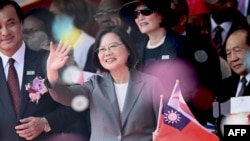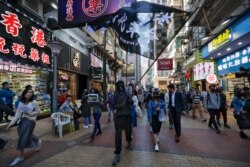Taiwan President Tsai Ing-wen, a thorn in the side of China, saw her approval rating plunge to 24% about a year ago. Now the leader who continues to resist Beijing enjoys a more than 55% approval rating – a month before she stands for reelection.
The 63-year-old law scholar made the comeback on tailwinds from the Hong Kong mass protests since June and support from the government of U.S. President Donald Trump as he resists China for his own reasons, people watching the election campaign say. The protests and Trump effectively confirm Tsai’s agenda of minimizing Beijing's influence over Taiwan, they say.
“Tsai Ing-wen’s actions of rejecting mainland China, blocking mainland China and rejecting exchanges with mainland China have suddenly changed from being questioned by a lot of people to where some people think those actions might be safer in the short term,” said Huang Kwei-bo, vice dean of the international affairs college at National Chengchi University in Taipei.
Tsai, first elected in 2016, will go up for reelection January 11 against Han Kuo-yu, a southern Taiwan mayor backed by Taiwan’s more China-friendly Nationalist Party.
China and Taiwan have been separately ruled since the Chinese civil war of the 1940s, when the Nationalists lost to the Communists and rebased their government in Taipei. China claims sovereignty over democratically ruled Taiwan and insists that the two sides eventually unite, by use of force if needed.
Hong Kong influence
Months of mass protests of up to 1 million-plus people in Hong Kong, aimed largely against rule by Beijing, help Tsai remind Taiwanese of what would happen if China gained influence over Taiwan, said Shane Lee, retired political science professor at Chang Kung Christian University in Taiwan.
China rules Hong Kong under what the Communist government calls “one country, two systems,” implying a degree of autonomy for the former British territory. Protesters first rallied around a now defunct extradition law proposal that would let Hong Kong criminal suspects be deported to China, where punishments are harsher.
Tsai said in June, shortly after the demonstrators started, she backed the Hong Kong protesters and urged the protection of freedom, democracy, and human rights in their territory. Days later she issued a statement saying the “democratic protests” in Hong Kong make Taiwanese “cherish their existing democratic system and way of life even more” while showing that China’s model for ruling Hong Kong is “not viable” for Taiwan.
In October she condemned Hong Kong police for a live-fire shooting of some of the protesters.
“The Hong Kong issue really scares Taiwanese people,” Lee said. “They just look at how China’s power can influence Hong Kong’s security, and Taiwan will be the next.”
Tsai rejects Beijing’s call for negotiations on the precondition that both sides belong to a single China. About 80 percent of Taiwanese oppose unification with the Beijing government, Tsai’s China policymaking body found in surveys in January and March.
Mass rallies in Hong Kong “help Tsai establish that Taiwan is in danger,” which in turn “helps the incumbent government,” said Joanna Lei, chief executive officer of the Chunghua 21st Century Think Tank in Taiwan.
Trump’s support
Taiwanese support their president all the more because over most of her term the U.S. government has helped Taiwan resist China, scholars believe. Trump’s administration, facing its own struggles with Beijing, has approved weapons sales, sent warships to the ocean strait separating China from Taiwan and signed pro-Taiwan legislation.
China periodically passes ships and military aircraft near Taiwan, putting the island's armed forces on alert.
Because of pressure from China and Taiwan's shortage of formal diplomatic allies -- China pays many to switch allegiance -- people on the island take heart when a major power backs their government.
“Donald Trump is still helping Tsai Ing-wen, because the United States is sending extremely strong signals to Tsai Ing-wen’s main campaign theme, which is ‘you fight China and America will support you,’” Lei said.
Public opinion shift
A Taiwan Public Opinion Foundation survey of 1,078 people in mid-November found that 55.5% of Taiwanese approved of Tsai. Of that portion, the number of people who were “extremely supportive” rose about six percentage points from October.
“As long as she doesn't make any blunders, I think she will be okay come the election time,” Lee said.
Tsai was polling at 24 percent after her Democratic Progressive Party lost a series of local elections in November 2018. Approval began to pick up in January as Tsai spoke out against Chinese President Xi Jinping's speech that month advocating Hong Kong-style rule over Taiwan. Tsai's approval rating had hit 34.5 percent by January 21, according to a Taiwan Public Opinion Foundation survey.
A presidential office spokesperson attributed the boost in Tsai’s approval ratings over the past year to “numerous reasons” Monday but did not specify which ones.





